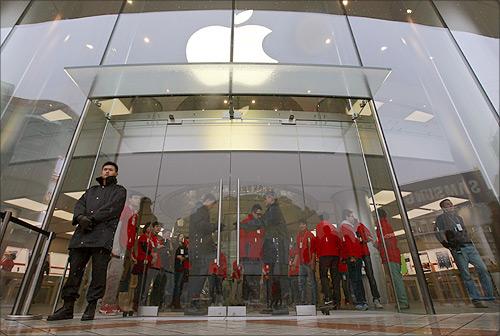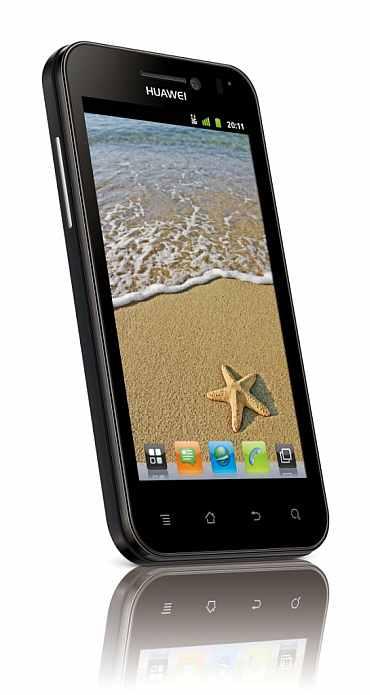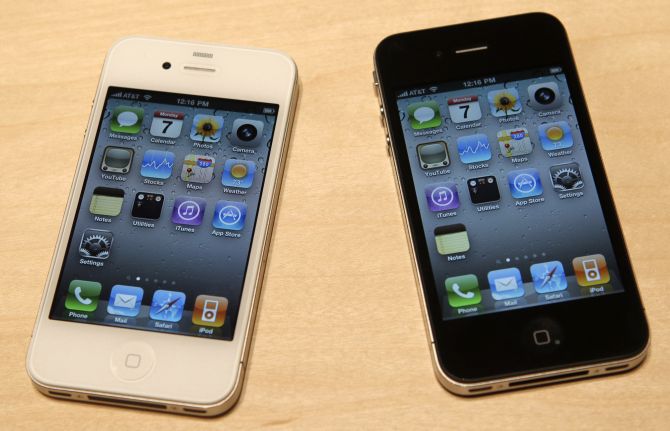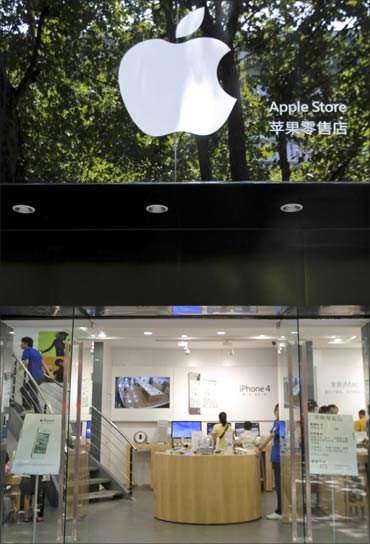Photographs: Truth Leem/Reuters
By 2030, China would account for more than half the global trade in high-tech goods.
Exports of high-tech products will grow more quickly than exports of other goods over the next 15 years as emerging Asia moves away from being a low-cost production hub for foreign brands and toward developing value-added local products, according to research from HSBC.
High-tech goods would make up more than 25% of goods traded by 2030 compared to 22% in 2013, HSBC said in its latest global trade report, which forecast trade would pick up only slowly in the near term.
The value of global goods trade would rise at an average rate of 8% a year from 2014 to 2030, with high-tech goods rising about 9% a year, HSBC said. Mineral fuels would rise 5% a year and raw materials about 6%.
…
China to beat US in high-tech trade
Image: Security guards and staff stand at the entrance of an Apple store during the release of iPhone 5 in Beijing's Wangfujing shopping district.Photographs: Petar Kujundzic/Reuters
The World Trade Organisation data show fuels and mining products were the fastest-growing export category between 2009 and 2012, followed by agricultural products. Exports of office and communications equipment rose 27 per cent over the period.
HSBC said much of the future increase in high-tech trade would be driven by internationalisation of supply chains, with parts for high-tech products crisscrossing national borders, but Asian firms would also snare market share from Western competitors.
HSBC forecast that by 2030, China would account for more than half the global trade in high-tech goods.
Hong Kong and the United States would remain in second and third place, although with a lower market share, and Korea would displace Singapore as the fourth-biggest exporter of high-tech goods.
…
China to beat US in high-tech trade
Image: World's third-biggest smartphone manufacturer, Huawei Technologies.Photographs: Courtesy,Huawei
China, home of the world's third-biggest smartphone manufacturer, Huawei Technologies, and the biggest PC maker, Lenovo Group, is already ramping up spending on research and development, as is Malaysia.
"These two economies may have depended on foreign investment to fuel their early growth in high-tech exports, but they are now increasing their technological know-how and moving up the value chain to develop high-tech products of their own," HSBC said in the report, based on forecasts from Oxford Economics.
China, India and Indonesia are among 10 countries on a US "watch" list for failing to protect US companies' intellectual property rights, for example through lax rules against trade secret theft or poor patent protection.
…
China to beat US in high-tech trade
Image: China accounted for 36.5 per cent of high-tech goods exports in 2013.Photographs: Reuters
The United States and European Union are also pushing China to resume talks on expanding a list of high-tech products covered by a 16-year-old pact that eliminated duties on products including personal computers, laptops and telephones.
The HSBC report showed China accounted for 36.5 per cent of high-tech goods exports in 2013, followed by Hong Kong at 13 per cent. The United States was in third place at 9.6 per cent. In 2000, the United States was the world's biggest tech exporter with a market share of 29.2 per cent.
HSBC said Asian countries also logged a high share of high-tech imports, as did the United States.
…
China to beat US in high-tech trade
Image: Customers and employees are seen in a fake Apple store in Kunming, Yunnan province.Photographs: Reuters
"This internationalisation of supply chains explains why the United States - the designer of devices such as the iPhone and a country with an evident comparative advantage in the high-tech sector - operates a trade deficit in these goods," HSBC said.
"The outsourcing of production of high-tech goods by US companies to serve the large domestic consumer market for these goods means that US companies import a large quantity of assembled products that they have designed themselves."
The data highlight why the United States and other trading partners such as Japan, Canada and Korea are keen to restart talks on the WTO's Information Technology Agreement, or ITA, which reached an impasse in November.
…
China to beat US in high-tech trade
Photographs: Reuters
China has said cutting all tariffs to zero would be unfair and wants some products excluded and others to have a long phase-in period, saying the pact has to take into account differing levels of development.
Michael Punke, US ambassador to the WTO, on Monday urged China, as this year's chair of the Asia Pacific Economic Cooperation trade group, to take up calls to conclude an expanded ITA by the next regional trade ministers' meeting in May.
"We think this is a doable goal and we encourage China, as host country, to exercise leadership in helping to achieve this," he said in a statement.
The US administration estimates expanding the ITA to drop duties on additional technology products could liberalize roughly $1 trillion in global IT and communications trade and increase annual global economic output by $190 billion.
The WTO has forecast global goods trade growth of 4.5% in 2014, below the average rate of 5.4% recorded from 1982 to 2012.







article